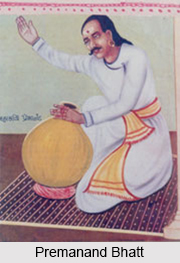 Premanand Bhatt (1649-1719) was an Indian poet who is known for his contributions in Gujarati Literature of the medieval era. More popularly known as Premanand, he was also a "Manabhatt", professional story teller known for his compositions of the Akhyana literary form, which was also practised as theatre enactment in the western Indian state of Gujarat.
Premanand Bhatt (1649-1719) was an Indian poet who is known for his contributions in Gujarati Literature of the medieval era. More popularly known as Premanand, he was also a "Manabhatt", professional story teller known for his compositions of the Akhyana literary form, which was also practised as theatre enactment in the western Indian state of Gujarat.
Literary Life and Contributions of Premanand Bhatt
Premanand Bhatt was born in Vadodara, in the caste of the Nandora Chaturvanshi Brahmins. In the colophons of his Akhyana recitations, his remarks meant and were like "Place of braves called Vadodara, Situated in the middle of Gujarat, caste Chaturvanshi Brahmins, Bhatt Premanand is the name". In those times, Gujarat was ruled by Mughal emperor Aurangzeb. At that time, it was openly said - "Marwari language is valued at 16 aanas (equivalent to 1 rupee), Kachhi language is valued at 12 aanas, Marathi language is valued at 8 aanas, while Gujarati language is valued at 4 paise (equivalent to 1 aana)".
Born at the time when Gujarati language was devalued in such a manner, Premanand vowed that, "I shall not put on a Turban on my head till the time I earn a respectable position for Gujarati Language".
By supposed divine inspiration, Premanand Bhatt undertook the commendable but Herculean task of taking the Ramayana, Mahabharata, Bhagwata, Harivansh Purana and life episodes of devout-poet Narsinh Mehta through "Maankala" (with the help of playing Mana) across numerous villages in Gujarat. Premanand provided invaluable service to the Gujarati Language as well as to the people of society by poetically narrating the religious and social inheritance of the Middle Ages, i.e., episodes from the epics and scriptures in a simple and effective language and also performed valuable act of cultural awakening. Premanand`s compositions are priceless possessions of Gujarati Literature and are the cultural inheritance of Gujarati populace.
Renowned Gujarati poet Narmad has noted about Premanand Bhatt: "Premanand`s language is universally uniform. The depiction of customs, traditions and nature of people; and verbal depiction of incidents garnished with exaggerated descriptions have found their prominent place in the vernacular language. This is the beauty of Premanand`s verses."
Also the eminent Gujarati novelist Navalram has commented: "It is not surprising that Premanand who hails from Vadodara, who has written poetry on pure and profound love and whose name has become so dear to those art-loving people who have experienced divine love and pleasure; enjoys the supreme position amongst the contemporary poets. I personally believe that it is his modesty and humbleness that he obliges the other three frontline poets by allowing them to sit near the steps of his artistic kingdom! Really! Gujarati people should be proud of Premanand."
Premanand Bhatt has structured his poetic verbal recitals as per time and incidences. For example, the importance of "Okhaharan" (Abduction of girl named Okha) in the month of Chaitra (6th month of the Vikram year), the pleasure of listening to a detailed poetic depiction of the marriage of Shamalsha, son of Narsinh Mehta, in the month of Vaishakh (7th month of the Vikram year) which is the season for marriages, while in Bhadarvo (11th month of the Vikram year), the month of making ceremonial offerings to the dead ancestors, he would present a poetic recital on the description of such offerings to the deceased father of Narsinh Mehta.
Premanand Bhatt was known by the title of "Raskavi" (Poet of sentiments). His known literary contributions include "Nalakhyan", "Sudamacharitra", "Dashamskandh", "Rannyagna" and "Okhaharan". Premanand is at the top of the list of "Akhyanakars".
Manabhatt Tradition of Premanand Bhatt
Mana is a pot made of copper, displayed before the audience, which used to be made of soil earlier. Premanand Bhatt put on rings called "Vedh" on all his ten fingers and played Mana in a rhythm to create melodious sounds as per the need of the narration being done by him verbally. The intensity and tone of the sound is varied as per the subject matter of the narration, for example, while depicting the war of Mahabharata, the Manabhatt would loudly narrate with action: "Sounds of "Kill them, "Kill them" are heard... The earth starts vibrating ... and turbulence prevails..."
Manabhatts used to exist even before Premanand, but Premanand`s Akhyanas (poetic recitals) are popular even today. Through his creations using various "Chhand", "Duha", "Chopai" and "Dhhal", he would make his poetic recitals very popular and through them, he would express the main and true essence of the subject matter. Even today, people are interested in listening to such recitals. Apart from using "Chhand", "Duha", "Chopai" and "Dhhal", he would keep varying forms of "Taal", which would enable his audience to get deeply involved in his presentations. The poet would also include the contemporary customs and traditions, dressing and social structure, etc., in a very detailed manner. These recitals were made so lively using the "Navras" (nine poetic sentiments) in a balanced manner that even today, while listening to them, the audience visualises the verbal recitals.
Related Articles:
Gujarati Literature
Brahmins
Villages in Gujarat
Gujarati Theatre




















